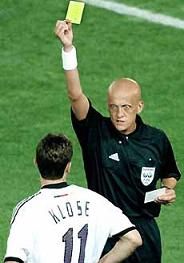arbitration

Arbitration is a term that is associated with the ability or act to arbitrate. This verb, which comes from Latin arbitrāre, refers for its part to grant or suggest arbitrations.

Arbitration, therefore, involves developing the function of referee and resolve certain issues. In the sport, the referee is the person in charge of ensuring compliance with the regulations of the discipline in question. All participants have to follow his orders, since he is the maximum responsible within the field of play. The number of referees per game depends on the sport in question.
In the case of football, for example, there is the participation of a main referee; two referees who act as his assistants and who are located in what are the bands of the field of play; and a fourth referee who is the one who helps the first one to carry out the annotation of warnings or changes and who will also be in charge of replacing any of the three previous ones who have to leave their functions due to injury.
Currently, on many occasions the teams that face each other in a match complain about the refereeing and the errors that said referees commit when calling fouls, establishing offside, expelling players or canceling goals. Hence, a series of technological devices have emerged with which it is sought to correct these human errors, such as the case of slow cameras or the system called hawk's eye.
In the field of right, arbitration is an alternative to resolve conflicts of interest without it being necessary to reach the usual jurisdiction. The parties to the conflict decide to choose a third party who enjoys independence (the arbitrator), who will be in charge of solving the dispute and pronouncing what is known as the arbitration award. For this, it must act fairly and respect the legislation agreed by the parties.
In this field, it should be emphasized that basically two clearly differentiated types of arbitration are established. Thus, in the first place, there would be the one known as independent, which is the one in which the parties that are in conflict are the ones who choose the arbitrator or arbitrators who are going to act in the process and are also the ones who determine the rules to be followed.
Second, there is the so-called institutional arbitration. As its name indicates, it is a specific institution that determines both the aforementioned rules and the person who will be in charge of acting as referee.
In the economy and the finance, arbitrage involves seeking a benefit in the price difference that exists between several markets. For this, complementary operations are carried out that allow the capitalization of the different prices. Through arbitration, those involved have access to an instant profit.
In this sense, the entity in charge of the arbitration is called arbitrageur and it is usually an investment firm or a bank.
Leave a Reply